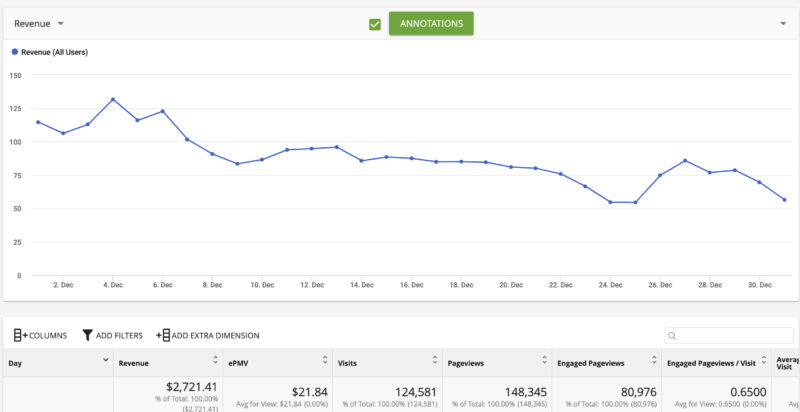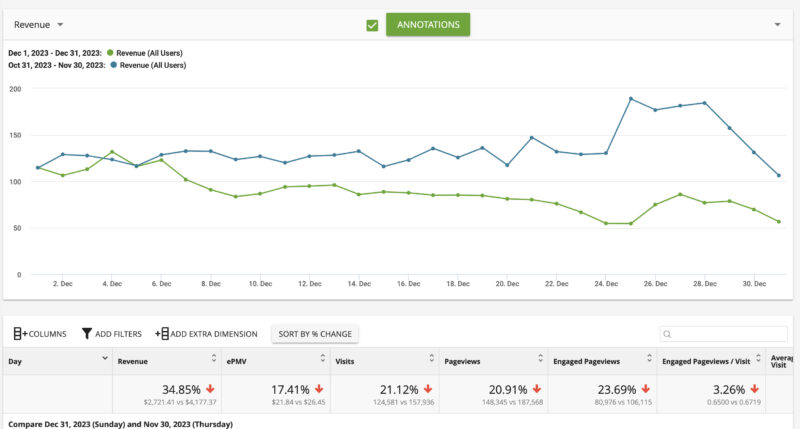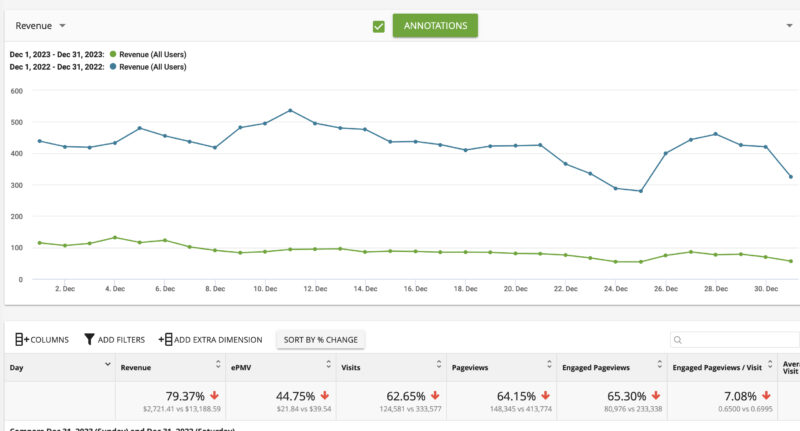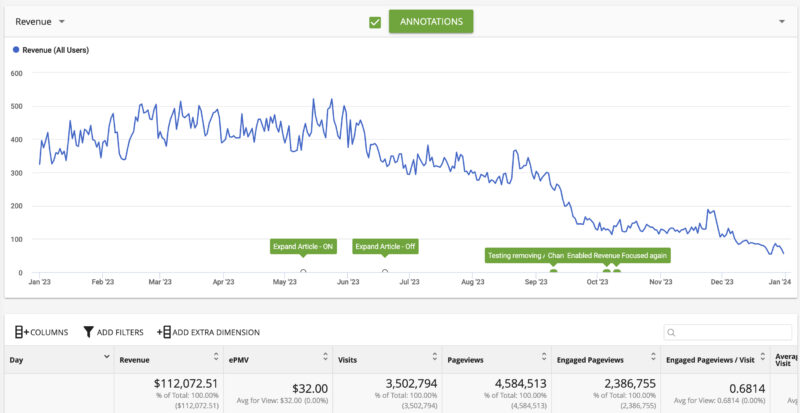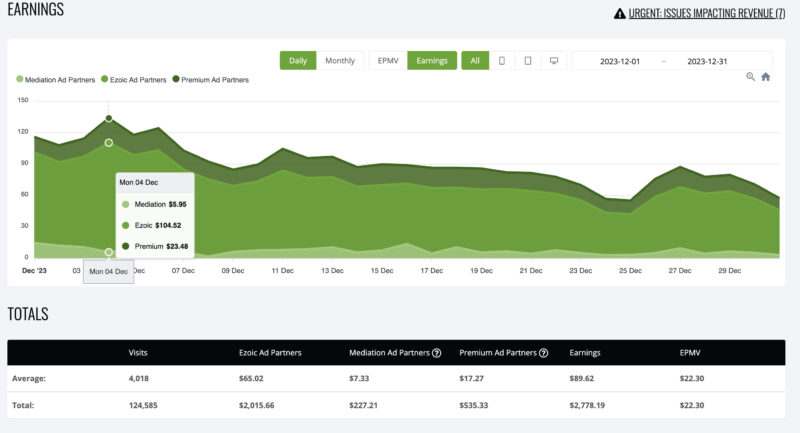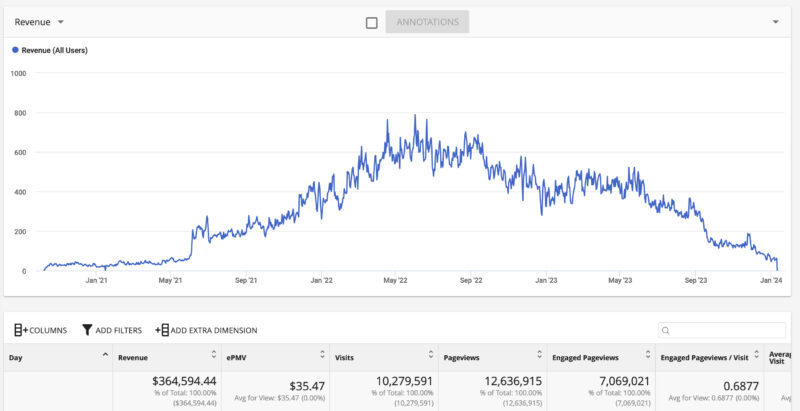From an SEO perspective, Google’s recent algorithm updates to their ubiquitous search engine have been rather puzzling, to say the least, which is no doubt problematic for us, given that more than two-thirds of our case study domain’s traffic came from Google. These radical changes have led our case study domain to notch another new low in ad revenues as of December 2023, at just $2,721 for the entire month.
Not a great way to end the year! Ultimately, we’re seeing red across the board, which contributed to the roughly ~34.85% decline in monthly ad revenues. Our case study domain’s page visits have dropped by a disappointing ~21.12%, while pageviews and engaged pageviews have slowed by ~20.91% and ~23.69%, respectively, compared to November 2023. It gets worse when you compare it to December 2022.
If you’d like to learn more and get a month-by-month overview, click on that Revenue Reports tab up top to get a better look, and make a more detailed comparison. Speaking of, when pitting December 2023 as well as December 2022 side-by-side, the figures are eye-watering. A ~79.37% drop in revenue, a ~62.65% decline in visits, a ~64.15% downturn in pageviews, and a ~65.30% reduction in engaged pageviews.
At least these difficult times are made a tad easier, as our case study domain is being monetized through Ezoic. The aforementioned $2,721 figure can be broken down into three parts; ~$2,016 came from Ezoic’s regular ad partners, while ~$227 is thanks to Ezoic’s mediation service, allowing us to monetize alongside another ad provider, and the other ~$535 is courtesy of Ezoic’s higher-paying Premium ad partners.
| December 2023 Ad Revenue From Ezoic | ||
|---|---|---|
| Revenue (Total) | $2,721 | |
| Traffic | Visits | 124,581 |
| Pageviews | 148,345 | |
| Engaged Pageviews | 80,976 | |
| ePMV (Earnings Per Thousand Visitors) | $21.84 | |
Looking Further Into All The Data
Having mentioned that, our case study domain is a part of Ezoic’s Premium tier, whereby, with a monthly fee, our enrolment entails access to Ezoic’s more deep-pocketed advertisers, which ensures that we could get a bigger cut of the ad revenues compared to their basic ad partners. If you’d like to learn more, check out our guide on how to optimize Ezoic for maximum ad revenue and how to get started with Ezoic.
While you’re there, we have plenty of other free resources here, on this site, which may prove useful with these recent Google algorithm changes and updates. This includes my detailed and in-depth analysis and insights into making money online from content creation websites, and you could also check out my paid training course too, if you’d like to know more about what I’ve learned and experienced over the years.
Some of these teachings and guidance may prove valuable in navigating the uncertain times ahead. Our case study domain did, after all, earn more than ~$112,000 in ad revenues throughout 2023, despite the huge changes in Google’s algorithms that threw off years of SEO knowledge and refinement into the bin. And, in that time, we drew in over 3,500,000 page visits and way more than 4,500,000 pageviews.
So, it’s not a complete write-off, but with those typically brutal January CPMs kicking in, we may see our case study domain’s EPMVs (earnings per thousand visitors) drop even more this month, even compared to the already low $21.84 monthly average that we saw this past December 2023 (a ~17.41% drop when compared to November 2023). Alas, this is going to impact every publisher, so bear that in mind.
Google’s Helpful Content Update (HCU)
If you’ve not been through our previous months’ revenue reports, then it’s time we explain what Google’s new Helpful Content Update (HCU) guidelines are. This is Google’s new set of rules and guidelines on how its search engine ranks websites and gives them priority in the search engine results page (SERP). This big new update now prioritizes sites and pages that provide short, concise, helpful, and user-first content.
It’s not like our case study domain didn’t prioritize helpfulness or user-first content previously, but we did focus primarily on creating these long-form, 3,000-word, super in-depth, and detailed articles. Nowadays, that same format just doesn’t work anymore. Instead, Google’s new HCU guidelines, it seems, will rather prioritize short 1,000-word articles that are straight to the point, concise, and have no added fluff besides.
In addition, our previous style of creating content was based on a tried-and-tested SEO formula to game Google’s search engine, which worked great for us for years up till now, that puts less of an emphasis on internal/external linking or keyword targeting (i.e. are we linking to enough authoritative sites, or is the article/post in question containing enough high-volume keywords that we could also rank for, etc.).
These days, with Google’s new HCU guidelines, they’ve now prioritized an author’s EEAT (the experience, expertise, authoritativeness, and trustworthiness) as a benchmark. This meant we had to make changes on our end, such as creating detailed author profiles to show who we are, what we know, what our previous experiences were, why we’re qualified to talk about a specific subject, and why we can be trusted.
What Are We Going To Do Now?
Granted, good keyword research and being picky about keywords are still vital. So, do check out our guide on how to do good keyword research, as well as our list of the best free keyword research tools, and our on-page SEO checklist, to find out and learn more. After all, our case study domain, despite these recent setbacks, still managed to earn nearly $365,000 since these revenue reports began back in 2021.
Unfortunately, as for what we intend to do in the future, all we could really do is just ride it out, and pay very close attention to Google and what they’re doing. It’s worth bearing in mind that we’re not the only publisher suffering right now, as countless other niche sites (including our closest competitors), authority sites, blog sites, and so on, have also been negatively impacted by Google’s new HCU guidelines.
Most of us have been knocked down Google’s search results page, which means lower visibility for users who are likely to click through, which results in lower ad revenues. On the other hand, as a result of that new HCU guideline in place, a lot of user-generated content, including sites such as Reddit or Quora, is seeing a massive resurgence of web traffic, given how Google’s new algorithm gives them priority.
The best we can hope for right now is either; 1) Google reversing or paring back some of their recent and disruptive HCU rules and guidelines, or 2) Google updating and refining their HCU guidelines to allow the niche sites or blogs that have been severely impacted a fairer shot at ranking competitively. As for us, it’s back to working on content refresh, and continually re-tweaking our content to match Google’s HCU.
Video Overview
This is on top of more changes to our editorial policy, updating our site maps and navigation, fine-tuning our site’s UI and UX, and so on to add more polish. Otherwise, we’ll keep carrying on and see how it goes. If you’d like to learn more, check out the video overview down below, and if you need to ask me anything personally, head over to the Ask Me section, and I’ll try my best to answer your questions.


